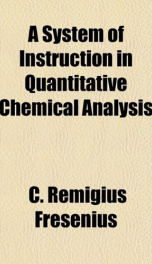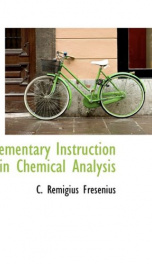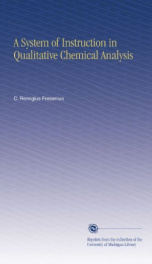a system of instruction in quantitative chemical analysis

Purchase of this book includes free trial access to www.million-books.com where you can read more than a million books for free. This is an OCR edition with typos. Excerpt from book: To this brief intimation of the general purport and object of quantitative analysis, and the general mode of proceeding in analytical researches, I have to add that certain qualifications are essential to those who would devote themselves successfully to the pursuit of this branch. These qualifications are, 1, theoretical knowledge ; 2, skill in manipulation ; and 3, strict conscientiousness. The preliminary knowledge required consists in an acquaintance with qualitative analysis, the stoi'chiometric laws, and simple arithmetic. Thus prepared, we shall understand the method by which bodies are separated and determined, and we shall be in a position to perform our calculations, by which, on the one hand, the formulas of compounds are deduced from the analytical results, and, on the other hand, the correctness of the adopted methods is tested, and the results obtained are controlled. To this knowledge must be joined the ability of performing the necessary practical operations. This axiom generally holds good for all applied sciences, but if it is true of one more than another, quantitative analysis is that one. The most extensive and solid theoretical acquirements will not enable us, for instance, to determine the amount of common salt present in a solution, if we are without the requisite dexterity to transfer a fluid from one vessel to another without the smallest loss by spirting, running down the side, fec. The various operations of quantitative analysis demand great aptitude and manual skill, which can be acquired only by practice. But even the possession of the greatest practical skill in manipulation, joined to a thorough theoretical knowledge, will still prove insufficent to insure a successful pursuit of quantitative researches, unless also combined with a sincere love o...
Info about the book
Author:
Series:
Unknown
ASIN:
B008NSFOSY
Rating:
4.5/5 (2)Your rating:
0/5
Languge:
English
Users who have this book
Users who want this book
What readers are saying
What do you think? Write your own comment on this book!
write a commentif you like a system of instruction in quantitative chemical analysis try:
Other books by this author
Do you want to read a book that interests you? It’s EASY!
Create an account and send a request for reading to other users on the Webpage of the book!




